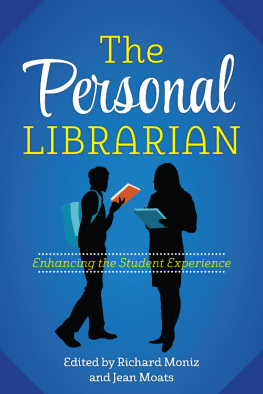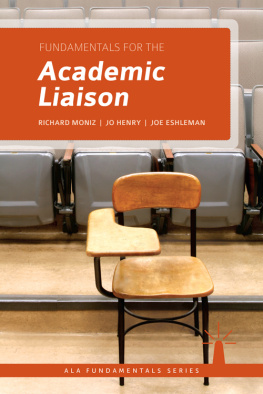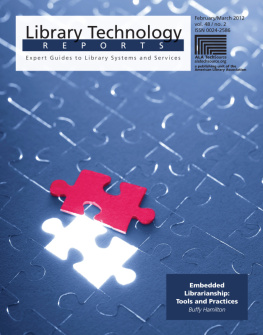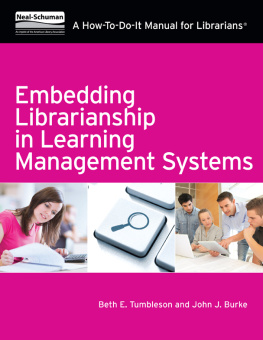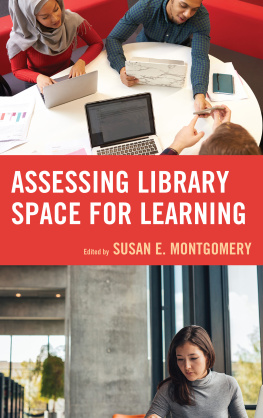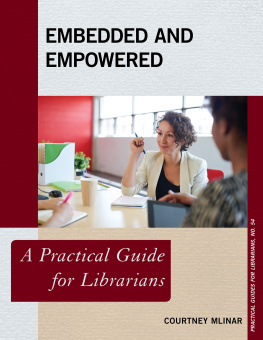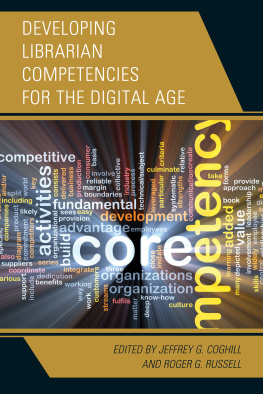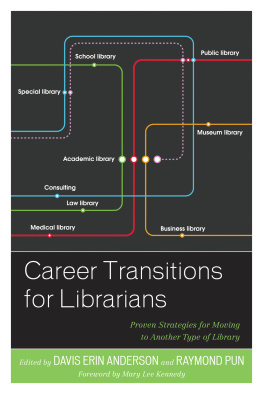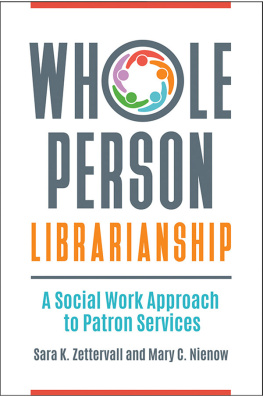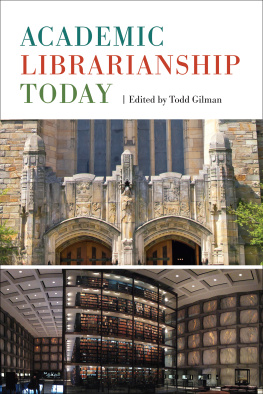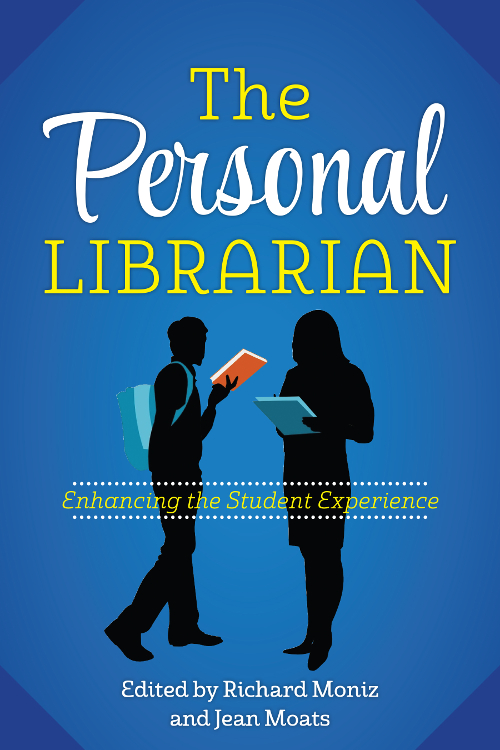
ALA purchases fund advocacy, awareness, and accreditation programs for library professionals worldwide.
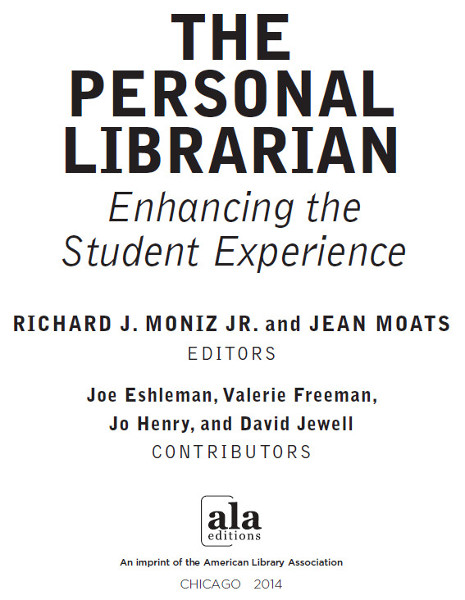
2014 by Richard J. Moniz Jr., Jean Moats, Joe Eshleman, Valerie Freeman, Jo Henry, and David Jewell.
Any claim of copyright is subject to applicable limitations and exceptions, such as rights of fair use and library copying pursuant to Sections 107 and 108 of the U.S. Copyright Act. No copyright is claimed for content in the public domain, such as works of the U.S. government.
Extensive effort has gone into ensuring the reliability of the information in this book; however, the publisher makes no warranty, express or implied, with respect to the material contained herein.
ISBNs: 978-0-8389-1239-3 (paper); 978-0-8389-1240-9 (PDF); 978-0-8389-1241-6 (ePub); 978-0-8389-1242-3 (Kindle). For more information on digital formats, visit the ALA Store at alastore.ala.org and select eEditions.
Library of Congress Cataloging-in-Publication Data
The personal librarian : enhancing the student experience / Richard J. Moniz Jr. and Jean Moats, editors ; Joe Eshleman, Valerie Freeman, Jo Henry, and David Jewell, contributors.
Includes bibliographical references and .
ISBN 978-0-8389-1239-3 (print : alk. paper) ISBN 978-0-8389-1241-6 (epub) ISBN 978-0-8389-1240-9 (pdf) ISBN 978-0-8389-1242-3 (kindle)
1. Academic librariesRelations with faculty and curriculum. 2. Academic librarians Professional relationships. 3. Information literacyStudy and teaching (Higher) 4. Library orientation for college students. 5. Academic librariesMarketing. 6. Academic libraries United StatesCase studies. I. Moniz, Richard J., editor. II. Moats, Jean, editor.
Z675.U5P472 2015
025.5'677dc23 2014014990
Cover design by Krista Joy Johnson. Cover images Shutterstock, Inc.
Contents
Richard Moniz
Jean Moats
Joe Eshleman
Valerie Freeman
Jo Henry
Jean Moats and Richard Moniz
Richard Moniz
David Jewell
Richard Moniz
Joe Eshleman
T he authors would like to offer our thanks and profound gratitude to all of our colleagues at Johnson & Wales University and at various other institutions (Nancy Bellafante, Jenna Freedman, Kelly Lawton, Shannon ONeill, and Laura Heinz especially come to mind in this regard). We regularly interacted with librarians and other educators who were willing to share their time and expertise. We would like to offer an extra special thanks to Peter Lehmuller, Justin Herman, Mason Bissett, Jan-Marie Lanuzza, Lisa Kendall, Susan Flaherty, Brian Mooney, John Maas, Emily Seelbinder, Mark Norman, Kenny Harmon, Daphne Thompson, Joan Geller, Patricia Childress, Alana Sherrill, Michael Stephens, Pat MacEnulty, Fernanda Tate-Owens, Vicki Cleveland, Amanda Winar, Ann-Marie Townley, Martha Griffin, Catherine Posey, Cheryl Murray, Kamisha Kirby, Bob Caldwell, and Stephanie Teasley. Collectively, they inspired, assisted, partnered, and encouraged us in developing our personal librarian program and this book. We would also like to thank Johnson & Wales Universitys Dean of Libraries, Dr. Rosie Hopper, and the Charlotte Campuss Vice President and Academic Dean, Dr. Tarun Malik, for their continued encouragement and leadership. Also, without the support and ongoing assistance of Jamie Santoro, our editor at ALA, this book would not exist (also critical was the assistance of Amy Knauer and her team when we reached the final stages). Authors Jo, Joe, and Richard would also like to thank Rachel Chance for all of her guidance and assistance with our previous ALA publication, Fundamentals for the Academic Liaison (as well as Rob Christophers efforts to get the word out about it). Last but not least we would like to thank all of the students who come to us with open minds, a willingness to learn, and a desire to be successful in their chosen careers. We wish them all the best and hope that the personal librarians here at Johnson & Wales University and those established elsewhere contribute in some small way to this process.
Richard Moniz
I walked into a local restaurant some time ago and was greeted by a young woman who looked very familiar. As she took my order she blurted out, I know who you are! I know who you are! Youre my personal librarian! I came back to the library that day, relayed the story, and began chatting with the other librarians who had also been involved in this new program. It turns out that, while we hadnt met with large numbers of students, we had all conversed with some who had recognized us from our role as their personal librarian. Many were as excited as this student whom I had seen at the restaurant. Some of us had met one-on-one with students who sought us out sometimes after class (we had at least one in-class session with students assigned to us), creating a rare opportunity to spend more focused time getting to know specific students while assisting them with their various research projects. We collected feedback in numerous classes and in a variety of ways through surveys, blogs, and quizzes. The following comment from one student stood out as being especially comprehensive and representative of other students opinions in the sentiment it expressed:
I have taken a few things away from having the resources of the library shown to me today. For one I now have a certain place where I can find information that isnt on Google. I feel I wasnt great at doing citations, but I am happy to see that I have a tab where I can relearn how to do citations in MLA format again. I feel a lot more confident with my research paper now since I have a few databases to choose from.... I also like the fact if I have a question about anything on the website or my research, I can have a direct link to e-mail my librarian [emphasis added] to help me out.... Having these resources shown to me and how to use them makes me feel less stressed about writing this research paper.
The response from faculty was likewise overwhelming. It seemed as though every time one of us attended a meeting outside the library or walked into the academic building where our classrooms are located we had faculty and staff patting us on the back saying, Way to go with the personal librarian program! What a great idea! The funny thing is that it took us a little while to digest the feedback, and it came as a bit of a shock because we had not made wholesale changes to what we were already doing. Rather, we took what we had been doing, changed our thinking a little, added to our existing approach in very targeted and specific ways, and then marketed it slightly differently than in the past. What we are here to tell you is that you can do this too. You can adapt our personal librarian program for your institution, as is discussed in various ways in this chapter. This does not mean throwing out the good things you have already been doing. It just means adapting a slightly different philosophy of service and incorporating some tweaks and changes that make sense for you and your institution. This will add to your success, the success of your library, and, most important, the success of your students. You can do this!
Where Did the Personal Librarian Concept Come From?
While the concept and implementation of personal librarian programs are relatively new, the program and idea itself represent an exciting historical evolution in relation to library services in higher education. This chapter seeks to expand upon some of those developments and place a personal librarian program within its appropriate contemporary context. What should stand out to the reader is that what academic librarians have been doing all along has proceeded in a very logical progression toward the implementation of this type of idea. Foremost in our lead-up to the personal librarian concept, the development and shift of emphasis on information literacy that became especially because these online courses, typically open to anyone and taught by some of the best professors in the world, are changing the higher education landscape altogether. Likewise, the role of academic library liaisons, while always critical to the success of academic library services, has shifted more from knowing the resources in a given area (although this is still important) toward establishing and building strong personal relationships with faculty in a given department, understanding faculty needs, and being able to assist faculty in new and often creative and collaborative ways. Finally, the personal librarian concept finds itself being born roughly within the context of an ever-increasing appreciation for retention in higher education. Businesses have always known the great value of keeping a customer relative to expending significantly more resources trying to find a new one. Higher education has shifted from placing bodies in seats toward making sure
Next page
